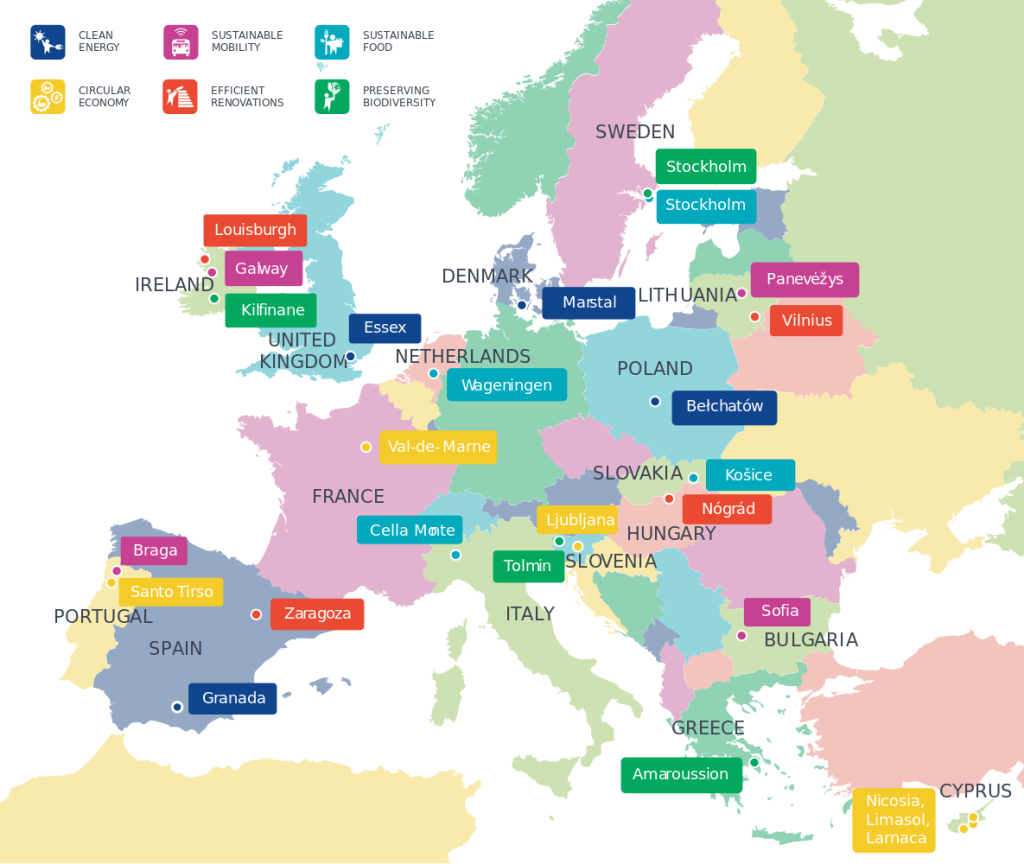Driving the Green Deal: Lessons from EU cities’ experiments
Learn from inspiring case studies on clean energy, circular economy, efficient renovations, and sustainable food systems
How can we fulfill the Green Deal?
From clean energy to circular economy; from efficient renovations to sustainable food systems, cities around Europe are designing and testing participatory methodologies and concrete actions to transform challenges into solutions, thus paving the way to climate neutrality.
Let’s have a closer look at what cities have recently implemented and get inspired by the lessons learned!
Community visioning for a clean energy future across Europe
A committed society is key to planning and implementing a successful transition to clean and just energy systems. Granada (Spain), Bełchatów (Poland), and Jaywick (UK) and Ærø (Denmark) involved residents, policymakers and businesses in conversations about energy to create locally-appropriate strategies.
Of course, engaging people is not an easy task, especially the youngest. Here are a few tips:
- Start from people’s current concerns, focusing on social or economic challenges and how these relate to energy, and using the present to understand the future.
- Team up with community youth leaders, use relevant channels, and offer age-appropriate activities.
- Embed visioning activities within existing, long-term organisational efforts to maximise the impact despite a limited budget.
The experiment reached around 400 participants across 21 workshops. Community participants learned about what they can do to save energy in their daily lives. Policy, business and community actors found a space to network and kickstarted collaborations on new developments, such as energy hubs and solar energy communities.
Fostering circular economy innovation in textiles and construction across Europe
Four accelerator hubs were developed in Santo Tirso (Portugal), Val-de-Marne (France), Cyprus, and Ljubljana (Slovenia), bringing together stakeholders – making sure to also involve disabled individuals – to spark a sustainable business transformation in textiles, fashion, and construction.
Recruiting stakeholders and generating interest in design thinking might be challenging, especially with a small budget. Considering the following strategies:
- Stakeholders need a dedicated space to interact and exchange knowledge to ensure the development of collaborative solutions and the application of best practices leading to innovative and broadly accepted outcomes.
- Tailor solutions to the local market, especially in sectors like construction, to meet unique needs and address specific issues.
- Foster a stronger dialogue between industry and government during public consultations for effective, feasible, and widely accepted regulations.
- Share good practices with others to foster innovation, as businesses often lack awareness of tools and methods to drive structured innovation.
From the development of a tool kit for the design of circular construction projects to the creation of a specific platform for local sustainable fashion, the results of the local experiments yielded various innovative value propositions and solutions, highlighting diverse approaches to promoting circular practices in textiles, fashion, and construction.
Using home tours to increase inclusive energy-efficient renovations
Nógrád County (Hungary), Mayo County (Ireland), Zaragoza (Spain), and Vilnius (Lithuania) set up Renovation Knowledge Networks to help professionals and residents share practical and experiential knowledge and gain new insights into the possibilities of energy renovation.
Engaging with the most vulnerable citizens and gaining their trust, as well as convincing building professionals to share their knowledge, takes time and efforts. A few lessons learned:
- Intermediaries are crucial for reaching structurally excluded groups, as existing institutional mechanisms alone are insufficient.
- Ensure transparency about the motivations and goals of the network to gain people’s trust.
- Address local community needs, such as housing typologies and climate conditions.
- Meeting times should be accessible, taking into account holidays, care and work commitments. Propose evening and weekend options.
The local networks succeeded in bringing together actors with common interests while having different backgrounds and motivations to talk about what is needed for more energy-efficient renovations.
Co-creating sustainable food systems
A series of food assemblies took place in Stockholm (Sweden), Cella Monte (Italy), Košice (Slovakia) and Wageningen (The Netherlands) to explore transition dynamics in food systems and co-create a local action agenda with relevant stakeholders.
Ensuring gender balance and young people’s involvement, along with justifying an unpaid commitment during working hours was challenging. Some key takeaways include:
- Learn the assembly methodology more in advance and be bold, creative and experimental when facilitating.
- Remunerate participants for time spent in the assemblies.
- Connect with partners in other European locations to exchange information, and inspiration, and get support.
- Put emphasis on initial mapping and use it to contact local actors and establish a relationship long before the first assembly.
- Meals in assemblies are opportunities to taste local food, network, and brainstorm more informally.
- Maintain the element of co-creation between assemblies, especially towards building a common vision and action points. This was possible by co-working on shared documents remotely between the assemblies.
During the food assemblies, stakeholders identified a local narrative for sustainable food system changes and pathways to achieve them. The assemblies produced policy recommendations, action points, and advocacy activities, contributing to the transformation of the local food systems and supporting the implementation of the EU’s Farm to Fork strategy.
Can any of these takeaways be implemented in your city? Learn more by reading the whole report here.
These activities were carried out in 17 countries between April 2023 and June 2024 within the SHARED GREEN DEAL (Social sciences & Humanities for Achieving a Responsible, Equitable and Desirable GREEN DEAL) project. This EU-funded initiative aims to drive progress in the six Green Deal priority areas: Clean Energy, Circular Economy, Efficient Renovations, Sustainable Mobility, Sustainable Food, and Preserving Biodiversity. These social experiments follow the principles of transdisciplinary action research, incorporating practice-based knowledge and research from multiple disciplines.


